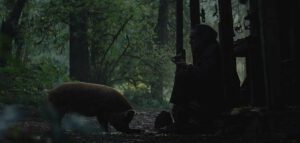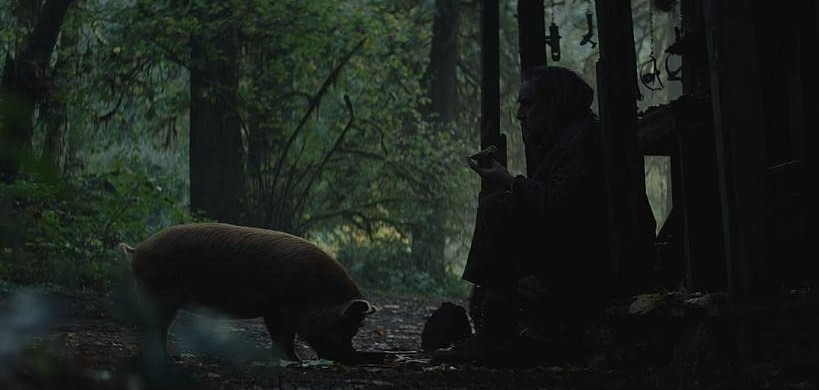Movie Info
Movie Info
- Run Time
- 1 hour and 32 minutes
- Rating
- R
VP Content Ratings
- Violence
- 3/10
- Language
- 3/10
- Sex & Nudity
- 1/10
- Star Rating
Relevant Quotes
A good name is to be chosen rather than great riches, and favor is better than silver or gold.
Then the LORD God said, “It is not good that the man should be alone…”

Though he lives in squalor with a pig as his sole companion, we eventually learn that truffle hunter Robin does indeed have “a good name.” Director and co-writer Michael Sarnoski’s film about the reclusive supplier of truffles to Portland Oregon’s upscale restaurant presents Nicolas Cage with a role that rises far above what the actor has sunk into for a couple of decades. I was also drawn to it because it is the second film to feature a pet pig that I have seen this year—see Mr. Pig in the July issue.
Living in a remote forest, the grizzled old man regards his prized truffle pig as more than a utilitarian instrument for find the prized subterranean edible fungi. Barely nodding when young Amir (Alex Wolff) drops by to purchase his weekly cache, Robin opens up to the pig, even though he seems not to have bestowed a name upon the creature. Then comes the night when some local toughs invade his tumble-down shack, beat him up, and steal his bosom porcine companion.
When Robin directs Amir to chauffeur him about in his yellow Camaro and interrogates some local hippy youth, we are led by Cage’s past performances to believe that we are about to witness another action flick in which Cage’s character will wreak vengeance upon the pignappers. Not so—and to ensure your enjoyment of this unusual film, I suggest that you pause your reading this review and go see the film first.
This is a quest film in which two men are changed for the better after facing up to loss and sorrow. With each scene we learn a little more about the reclusive Robin and the estranged from his father Amir. At an underground fight club where trufflers gather, the entertainment centers on betting whether a man can stand up to a beating for a full minute. Whereas in other films Cage would be doing the beating, here he stoically takes one, regaining the confidence of the man running the show, Edgar, who had known him when he was a revered chef 15 years earlier.
A clue from Edgar leads the pair the next day to visiting a trendy restaurant named Eurydice. (It is probably no coincidence that this name is from a Greek myth that also is also a quest story, the quest of Orpheus for his stolen wife in Hades.) The owner Chef Derek Finway is impressed to meet—again– the legendary chef still held in great esteem by Portland foodies, even though long-gone from the scene, but he is reluctant to talk about the pig. Robin remembers Derek as the assistant whom he had fired after two months service. He chastises him for abandoning his dream of opening a pub-style establishment, and instead bowing to the trend and cooking trendy food in this soulless place. Eventually Derek reveals that Amir’s wealthy father, Darius (Adam Arkin), is the man behind the theft of the pig. Amir recalls that his father and mother had always fought but the parents had enjoyed one night together when they had eaten at Robin’s restaurant.
How Robin reacts to all this will remind those who enjoy food movies of the greatest of them all served on the other side of the world, Babette’s Feast. Robin prepares his own version of a meal that transfigures those who consume it, transporting them to a better world, and thus maybe inspiring them to act in a better way. Certainly Darius, we learn when Robin first confronts him, needs such transformation—he attempts to buy off Robin with a large sum of money and then threatens him if he should continue his quest to get back his pet. The meal, for which Robin has gathered the ingredients from some interesting sources, is surreptitiously prepared in Darius’s own kitchen. It is based on Amir’s story of the meal shared by his parents at Rob’s restaurant years before, one that had brought about a truce between his warring parents. They remembered that event as one of their happiest together. Because Robin the culinary artist can recall every special meal that he has prepared, he is able to repeat and serve it to the surprised Darius. What transpires is not as blissful as in Babette’s Feast, but it is a satisfying ending nonetheless.
We learn that Robin had suffered a loss before that of his pig—an even greater one, which had impelled him to retreat from society. And yet even as a forest-dwelling recluse, his means for survival depended upon haute cuisine—the truffles sought after by the upscale chefs of the city. We are left to wonder about both Robin and Amir. Will Robin’s words to Dereck about following one’s passion no matter what apply to them as well?
This review will be in the September issue of VP along with a set of questions for reflection and/or discussion. If you have found reviews on this site helpful, please consider purchasing a subscription or individual issue in The Store.

